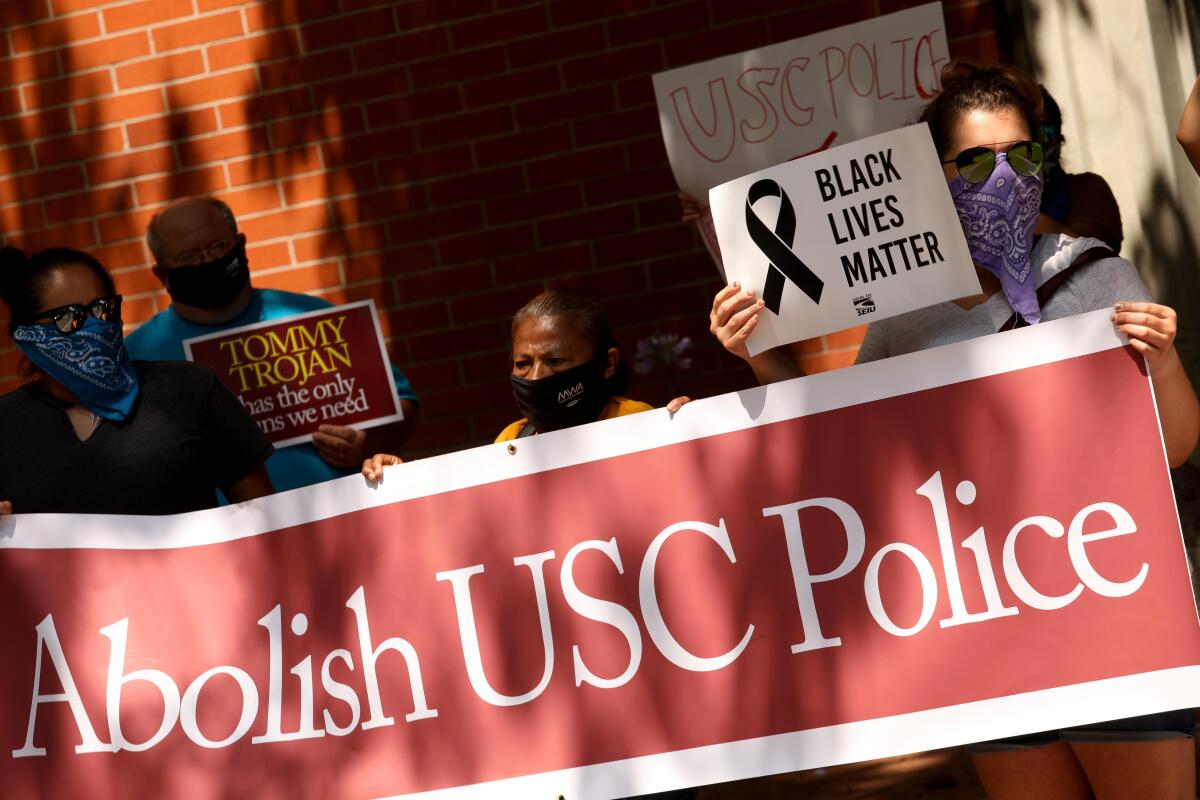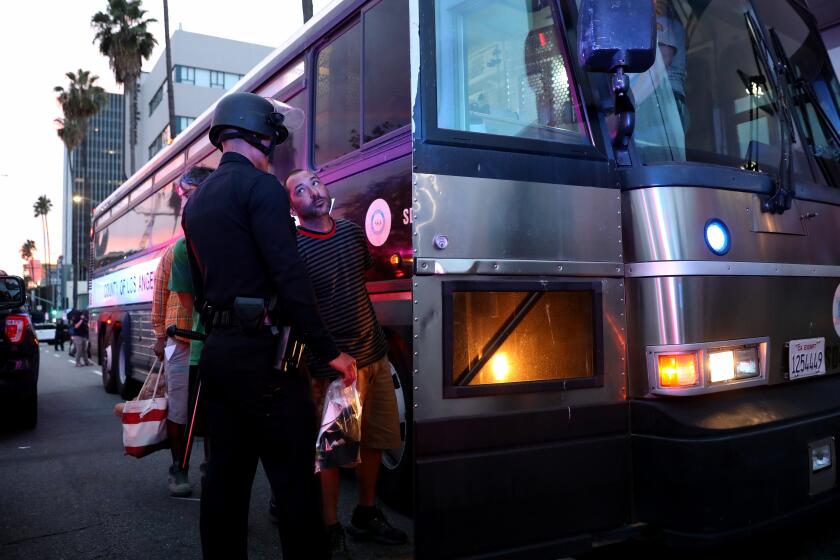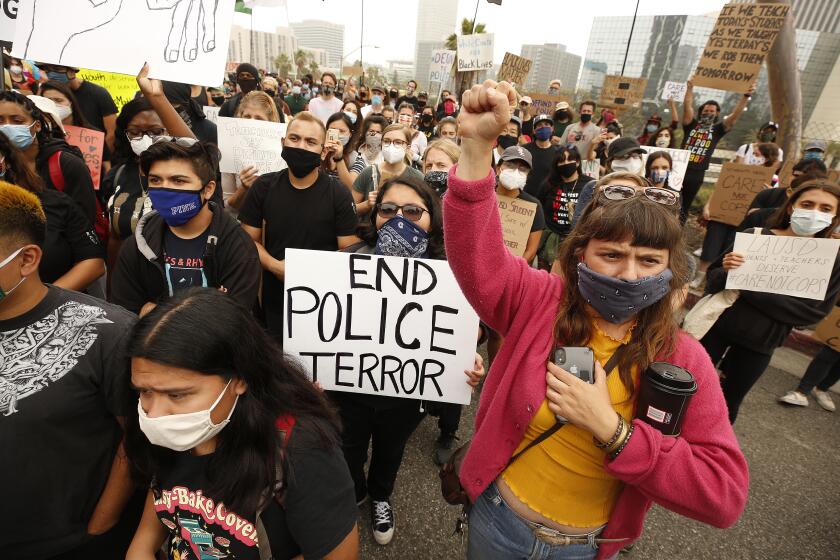At some U.S. universities, a time to rethink cops on campus

- Share via
Students at the University of Minnesota immediately condemned George Floyd’s killing, complained of clashes with officers and demanded that the school end its relationship with the Minneapolis Police Department.
The department acts as if “Black bodies are expendable,” students wrote in a petition after Floyd’s slaying in late May while in police custody.
The university, however, did not sever ties with Minneapolis police. University President Joan Gabel announced a scaling back of the college’s reliance on the department for services like support with large events, but not with some patrols and investigations.
Since Gabel’s announcement, at least 44 public and private universities in the United States have circulated petitions to remove police from their campuses. These efforts represent a small number of the approximately 3,700 degree-granting institutions identified by the National Center for Education Statistics, but they’re prodding the public to reevaluate the police’s role at universities, activists say.
Redefining the university’s relationship with the public
Many of the petitions calling for withdrawing funds from police simultaneously demand that money be reallocated toward resources that benefit not only students, but also the wider community.
At Columbia University’s Mailman School of Public Health, the Black and Latinx Student Caucus pair their demands for more Black faculty members and a “racial awareness and inclusion curriculum” with calls for financial aid for Black prospective students from the surrounding Washington Heights and Harlem neighborhoods. Activists also oppose policing these areas in the name of “student safety,” asking that funds instead be utilized to provide mental health and transportation services for students and the community.
Likewise, student activists at USC have mobilized to dissolve the college’s Department of Public Safety, which they say “over-police” Black and brown students and community members. Activists also want the university to invest in affordable housing for local residents and admit more students from neighboring South Los Angeles and Boyle Heights with full scholarships.
At the University of California, where tens of thousands of students, faculty and alumni have signed a petition calling for funds to be redirected to “community members in need,” outgoing system President Janet Napolitano warned against disbanding campus police.
“I think the better approach is to make sure that our police are properly equipped, that they have non-lethal options and are properly trained and supervised,” she said.
Late last month, the UC Academic Senate Council, which advises the president, endorsed substantial “defunding” of campus police, along with a ban on firearms as standard equipment; the dissolution of all partnerships with external law enforcement agencies; and studying modes of campus safety that can minimize reliance on policing.
Michael V. Drake, the incoming president of UC, said this week that he plans to examine campus security. Drake, who is Black, said he has experienced the harsh policing faced by people of color and wants to work on the relationships between police and communities.
Davarian Baldwin, professor of American Studies at Trinity College in Hartford, Conn., researches the relationships between universities and urban development. Debates about campus policing, he said, must consider the potential impact on surrounding communities.
“Across the country, universities have built urban clusters of housing, retail, and nightlife right in the middle of existing communities of color,” Baldwin said. “It’s not an accident that, in almost all of these cases, the jurisdiction of the police extends to the area that’s targeted for campus expansion. And in these campus zones, we find an intense surveillance of Black and brown behavior.”
After the university said LAPD used the stadium without its knowledge or permission, faculty demanded to know how that could have happened.
At UCLA, demands to replace campus police
After the Los Angeles Police Department used UCLA’s Jackie Robinson stadium to process arrests amid recent protests, educators formed the DIVEST/INVEST UCLA Faculty Collective and demanded that campus police be replaced with “anti-carceral” forms of accountability like transformative justice, which seeks to address conflicts and the conditions that make them possible. The collective also wants the university to cut ties with all external law enforcement agencies.
Chancellor Gene Block in June informed faculty that UCLA would expand the role of its Public Safety Advisory Council to review the university’s ties to outside law enforcement agencies and examine the campus police department’s responsibilities.
The university also announced the establishment of a Black Resource Center, something students have been trying to achieve for years.
Alexandria Davis, the outgoing chair of the Afrikan Student Union and a recent graduate, considers the timing of the move politically expedient.
“I’d been advocating for a Black Resource Center since I was a freshman,” she said. “And we were consistently told, ‘We don’t have the resources. We don’t have the space.’ I think they think that because they gave us one thing, we’ll be satisfied and not continue advocating for the other things. But that’s not the case.”
At Johns Hopkins, activists help stop the creation of a campus police force — at least for now
In June, administrators at Johns Hopkins University in Baltimore announced a two-year hold on plans to create a campus police department, saying they would wait for pending legislative efforts to advance police reform.
The plans to create the Johns Hopkins Police Department have been met with sustained opposition.
“It didn’t feel attuned to Baltimore as a city,” said Judah Adashi, professor of music composition at the university’s Peabody Institute. “The idea of introducing more police in a majority-Black city where Freddie Gray had just been killed by six police officers felt off.” Gray died in 2015 after suffering a severe spinal cord injury while in the custody of Baltimore police.
Some student and faculty activists maintain that a private police force would jeopardize the welfare of Black people on and off campus. Lester Spence, professor of political science and Africana studies, is among those leading efforts against the police department.
“It’s important to know that there are two angles to this,” he said. “One is the police themselves. The second is people calling the police.”
Spence cited a case in 2011, in which security officers descended on a Black student at the school library. The student, according to a witness, was writing in a notebook and listening to music on his headphones. Three officers approached him, demanding a photo ID to prove that he was a student. Afterward, the witness told officials that she heard a white student admit to calling security because the Black student “creeped her out.”
In 2019, activists staged a sit-in protest at the Johns Hopkins administration building. The action, which called for officials to cancel plans to establish the campus police, resulted in the arrest of seven protesters.
In January, resistance mounted after more than 100 faculty members issued a letter of protest against the project to the university’s Board of Trustees. Even so, the plans moved forward. Then, when racial justice demonstrations sprang up across the country, activists drafted a petition to stop the project.
That petition has more than 6,000 signatures, and it is still being circulated. In it, activists demand that Johns Hopkins “abandon, not pause” its plans.
The L.A. Unified school board considers the future of the L.A. School Police Department.
Is a police-free campus viable?
Those opposed to the presence of law enforcement agencies at universities often cite notorious encounters involving students, local residents and campus police. These include the killing of Samuel DuBose, an unarmed Black man who was shot in the head by a University of Cincinnati police officer in 2015. Activists also point to the use of pepper spray to break up a demonstration at UC Davis in 2011 and the infiltration of a student protest at the University of Chicago in 2013. Even when the encounters aren’t fatal, they argue, they can be corrosive.
James Alan Fox, professor of criminology, law and public policy at Northeastern University in Boston and author of the book “Violence and Security on Campus,” supports removing police from K-12 schools, but considers densely populated universities another matter.
“For the most part, campus security forces do a good job,” Fox said. “Plus, they provide things like escort services for students who need to walk home at night.” In his view, the petitions are an “overreaction to things we are seeing in terms of policing in America.”
But at schools like Portland State University and the University of Chicago, activists have sought to disarm and withdraw funding from campus police for years, long before Floyd was killed.
Adom Getachew, an assistant professor of political science at the University of Chicago, is a member of Scholars for Social Justice, a coalition of nearly 500 academics calling for campuses to cut ties with municipal police departments and gradually eliminate their own. “Defund the police” should be understood as part of a process, she said.
“I don’t think that everyone imagines that tomorrow we’re going to wake up and we’re going to get no more police and all the investments we want in our communities,” she said. “This is about taking steps to get us closer to our goal rather than merely doing reforms that leave us in the same place.”
Times staff writer Teresa Watanabe contributed to this report.
More to Read
Sign up for Essential California
The most important California stories and recommendations in your inbox every morning.
You may occasionally receive promotional content from the Los Angeles Times.













